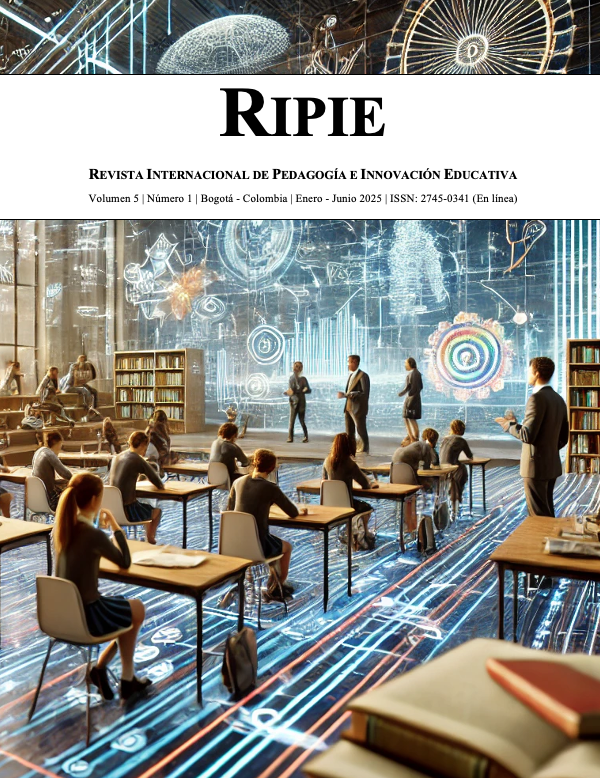Integration of critical thinking and decision-making in business education
Experiences at the university of Manresa
DOI:
https://doi.org/10.51660/ripie51237Keywords:
critical thinking, simulation, debate, vocational training, active learning, Business and administration, international tradeAbstract
This article analyzes the integration of critical thinking and decision-making in business studies at the University of Manresa, focusing on the experiences of Higher Vocational Training Programs in Business. Based on a comprehensive literature review, it explores how the use of academic debates, grounded in nine theoretical models, and the implementation of practical simulations can enhance students' cognitive skills and decision-making abilities. Debates are presented as a fundamental tool for promoting critical analysis through guided readings, while simulations allow students to contextualize business decisions in changing and complex environments. Through practical case studies applied during academic sessions, the effects of these methodologies are measured in the development of specific skills such as problem-solving, creativity, and ethical decision-making. The results obtained demonstrate that the combination of both pedagogical strategies fosters deeper and more meaningful learning, preparing students for highly dynamic and uncertain professional environments.
Downloads
References
Anderson, Phil & Lawton, Leigh. (2008). Business Simulations and Cognitive Learning: Developments, Desires, and Future Directions. Simulation & Gaming - Simulat Gaming. 40. 193-216. https://doi.org/10.1177/1046878108321624
Becker, Katrin. (2005). Learning by Doing, A Comprehensive Guide to Simulations, Computer Games, and Pedagogy in e-Learning and other Educational Experiences, 2005. by Clark Aldrich. The Canadian Journal of Learning and Technology. 31. 105-108.
Brookfield, S. D. (1987). Developing critical thinkers: Challenging adults to explore alternative ways of thinking and acting. Jossey-Bass.
Faisal, Nadia, Chadhar, Mehmood, Goriss-Hunter, Anitra, Stranieri, Andrew. (2022), Business Simulation Games in Higher Education: A Systematic Review of Empirical Research, Human Behavior and Emerging Technologies. https://doi.org/10.1155/2022/1578791
Feinstein, Andrew & Cannon, Hugh. (2002). Constructs of Simulation Evaluation. Simulation and Gaming. 33. 425,440. https://doi.org/10.1177/1046878102238606
Fisher, A. (2011). Critical Thinking: An Introduction. Cambridge University Press.
Freeman, S., Eddy, S. L., McDonough, M., Smith, M. K., Okoroafor, N., Jordt, H., & Wenderoth, M. P. (2014). Active learning increases student performance in science, engineering, and mathematics. Proceedings of the National Academy of Sciences of the United States of America, 111(23), 8410–8415. https://doi.org/10.1073/pnas.1319030111
Garo, Elona. (2017). Gap Between Theory and Practice in Management Education: Teaching Entrepreneurship Through Practice. https://doi.org/10.4018/978-1-5225-0770-3.ch014
Gredler, M. E. (2004). Games and Simulations and Their Relationships to Learning. In D. H. Jonassen (Ed.), Handbook of research on educational communications and technology (2nd ed., pp. 571–581). Lawrence Erlbaum Associates Publishers.
Hodgson, A., & Spours, K. (2003). Beyond A-levels: Curriculum 2000 and the Reform of 14-19 Qualifications (1st ed.). Routledge. https://doi.org/10.4324/9780203416631
Jonassen, D. H., & Grabowski, B. L. (1993). Handbook of Individual Differences, Learning, and Instruction. Routledge.
Kahneman, D. (2017). Thinking, Fast and Slow. Farrar, Straus and Giroux. https://doi.org/10.1017/CBO9781139012390
Kuhn, D., & Dean, D. (2004). Metacognition: A bridge between cognitive psychology and educational practice. Theory into Practice, 43, 268-273. https://doi.org/10.1207/s15430421tip4304_4
Kuhn, D. (1986). Education for Thinking. Teachers College Record, 87(4), 495-512. https://doi.org/10.1177/016146818608700404
Lean, J., Moizer, J., Towler, M., & Abbey, C. (2006). Simulations and games. Active Learning in Higher Education, 7(3), 227-242. https://doi.org/10.1177/1469787406069056
Lipman, M. (2012). Thinking in Education. Cambridge University Press.
https://doi.org/10.1017/CBO9780511840272
McMillan, J. H., & Schumacher, S. (2010). Research in Education: Evidence-Based Inquiry. Pearson.
Aclan, E. M., Noor Hashima, Abd Aziz and Valdez, N. (2016). Debate as a Pedagogical Tool to Develop Soft Skills in EFL/ESL Classroom: A Qualitative Case Study. Pertanika Journal of Social Science and Humanities. 24 (1): 213 – 240.
Paul, R., & Elder, L. (2003). The Miniature Guide to Critical Thinking Concepts and Tools. Foundation for Critical Thinking.
Prince, M. (2004), Does Active Learning Work? A Review of the Research. Journal of Engineering Education, 93: 223-231. https://doi.org/10.1002/j.2168-9830.2004.tb00809.x
Schumann, P.L., Anderson, P.H., Scott, T.W., & Lawton, L. (2001). A framework for evaluating simulations as educational tools. Developments in Business Simulation & Experiential Learning, 28, 215-220. Disponible en http://ABSEL.org
Scriven, M. & Paul, R. (2003). Defining critical thinking. Recuperado el 20 de marzo de 2017 desde Recuperado el 10 de septiembre de 2024 desde http://www.criticalthinking.org/pages/defining-critical-thinking/766
Shriner, Mary. (2006). Critical Thinking in Higher Education. InSight: A Journal of Scholarly Teaching. 1. 59-66. https://doi.org/10.46504/01200605sh
Sternod, L., & French, B. (2016). Test Review: Watson, G., & Glaser, E. M. (2010). Watson-GlaserTM II Critical Thinking Appraisal. Journal of Psychoeducational Assessment, 34(6), 607-611. https://doi.org/10.1177/0734282915622855
Thayer-Bacon, B. J. (2000). Transforming Critical Thinking: Thinking Constructively. Teachers College Press.
Zoller, U. (2018). Critical Thinking and Higher Order Thinking Skills in Higher Education: Bridging the Gap. Journal of Educational Research, 85(4), 301-315.
Downloads
Published
Issue
Section
License
Copyright (c) 2025 International Journal of Pedagogy and Educational Innovation

This work is licensed under a Creative Commons Attribution-NonCommercial-ShareAlike 4.0 International License.
Articles are published under the terms of a licence that permits use, distribution and reproduction in any medium, provided that the original work is properly cited. Ed&TIC retains the proprietary rights to the published works and actively promotes the reuse of these works under the terms of the aforementioned licence, which encourages the dissemination of knowledge and collaboration in the academic community.


